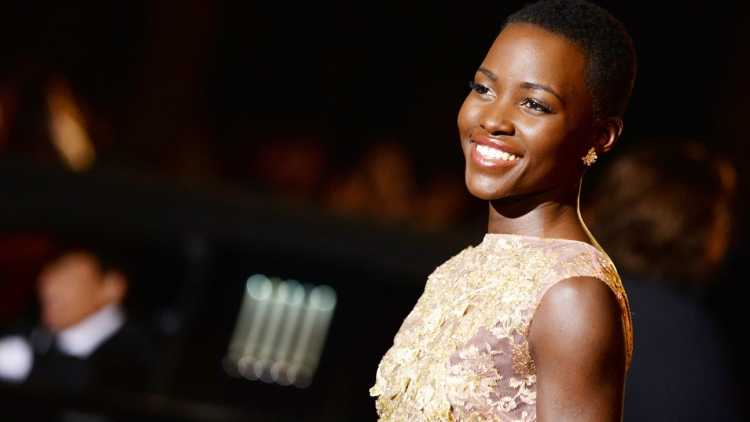An Ode to Lupita Nyong’o

Dear Lupita, I love you.
If ever granted the opportunity to meet actress Lupita Nyong’o this is the only thing I would be able to summon the courage to say.
Ever since seeing her traverse the red carpet of the Oscars donning the now iconic sky blue Prada dress, I realized that she is what I’ve been waiting for—a Hollywood approved role model.
I know it’s foolish to rely on Tinsel Town to provide an idol to model myself after, but there was something incredibly validating about having fashion bloggers and entertainment reporters fawn over her cocoa colored skin and signature cropped hair style. The night of the Oscars Nyong’o not only snagged the Fashion Police’s elusive vote for best dressed, but also won the esteemed Academy Award for Best Supporting Actress for her role in the film 12 Years a Slave.
In the weeks following the headlines belonged to Lupita. She quickly became the new “It Girl” of the tabloids. By the end of 2014 the Kenyan actress won numerous awards for her talent and beauty such as the Screen Actors Guild Award, NAACP Image Award, and People Magazine’s Most Beautiful Person of the Year award. Winning this title paved the way for endorsement deals like the contract she signed with prestigious makeup brand Lancôme. It seems that Nyong’o is hyper aware of the power her celebrity status wields in bringing attention to an often overlooked demographic by the entrainment industry—black females.
Before Nyong’o there had been only two other brown skinned female celebrities to be named one of People Magazine’s Most Beautiful in the 25 years of the lists existence. Nyong’o offers a different definition of attractiveness. Wall Street Journal columnist Teri Agins points out that unlike Halle Berry and Beyoncé, the past award winners from African descent, Nyong'o is not racially ambiguous. "She has African features, she's dark-skinned with nappy hair. And — she's beautiful," Agins said.
When asked about the sudden media attention, Nyong’o in her typically eloquent style stated that winning the title was of course flattering, but she was especially “happy for all the girls to see me [on it] and feel a little more seen.”
The moment I saw Lupita Nyong’o I realized that throughout my life the media has starved me from images of myself. Sure, dark-skinned mocha brown women could possess attractive qualities but never did I imagine that someone without flowing hair and mildly bronzed skin could be widely accepted as a standard of beauty. It’s amazing how Nyong’o has become a symbol of glamour that transcends racial boundaries.
In addition to being a symbolic shift in the standard of beauty she is incredibly poised. At the time of Nyong'o's newfound success the most prominent black female entertainer was the loveable bad girl Rihanna. While there is merit in Rihanna’s brand of raunchy seduction, it’s relieving to see a black celebrity with the elegance that Lupita Nyong’o offers.
Her work projects are also to be applauded. She is not only an actress but also a boss lady. She has directed projects such as the HIV-focused television show Shuga and produced the film In My Genes, a documentary about albinism in Kenya. I admire that she is able to work on socially focused projects despite her rising stardom.
Sometimes however I worry this sudden windfall of praise is rooted in infatuation with Nyong'o's exotic nature. Her introduction never fails to tout her diverse background. It is always mentioned that she was born in Mexico to Kenyan parents almost to separate her from the normalness that plagues American-born black women. Despite the possibility of unintentional racial superiority, Lupita Nyong’o is a class act whose passion for storytelling transcends her apparent beauty and grace. And that is why I adore her.
(Photos: People Magazine)









